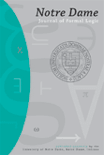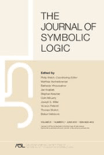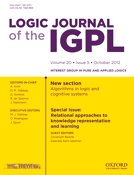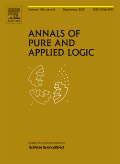
Australasian Journal of Logic
metrics 2024
Fostering collaboration in the realm of logic.
Introduction
The Australasian Journal of Logic is a prominent scholarly publication in the field of logic, published by the Australasian Association for Logic. With an ISSN of 1448-5052, this journal serves as a vital platform for disseminating research that advances the understanding and application of logical theory and its intersection with various disciplines. Although it is not open access, its rigorously peer-reviewed articles cater to academics, researchers, and students keen on exploring contemporary issues in logic both in theoretical and practical domains. The journal aims to foster scholarly communication and collaboration within the logic community, encouraging the exchange of ideas and insights that shape the future of logical studies. By contributing to the growing body of knowledge in this essential field, the Australasian Journal of Logic plays a crucial role in enhancing the intellectual landscape of logic research.
Metrics 2024
 -
- 0.60
0.60 0.70
0.70 -
-Metrics History
Rank 2024
IF (Web Of Science)
JCI (Web Of Science)
Quartile History
Similar Journals

Logical Methods in Computer Science
Connecting scholars to the future of computer science.Logical Methods in Computer Science is a premier Open Access journal dedicated to fostering scholarly dialogue within the realms of Computer Science and Theoretical Computer Science. Established in 2004 and published by LOGICAL METHODS COMPUTER SCIENCE E V in Germany, this journal aims to bridge theoretical frameworks and practical applications, providing a platform for innovative research and discoveries. With an impressive HIndex reflecting its commitment to high-quality research, Logical Methods in Computer Science has achieved a Q2 ranking in both the miscellaneous and theoretical categories of computer science, indicating its growing influence in the academic community. Researchers, professionals, and students are encouraged to access and engage with the wealth of knowledge this journal offers, which is freely accessible to facilitate widespread dissemination of cutting-edge advancements in logical methods. With its convergence period extending from 2005 to 2024, Logical Methods in Computer Science continues to be a vital resource for those looking to explore the intersections of logic, computation, and mathematics.

JOURNAL OF AUTOMATED REASONING
Pioneering Innovations in Computational TheoryJOURNAL OF AUTOMATED REASONING is a premier academic journal published by SPRINGER, focusing on the dynamic and evolving fields of Artificial Intelligence, Computational Theory and Mathematics, and Software. With an ISSN of 0168-7433 and E-ISSN 1573-0670, this journal ranks impressively in the second quartile (Q2) across multiple categories, reflecting its significant contribution to the advancement of knowledge in automated reasoning methodologies. Since its inception in 1985, it has served as a vital platform for researchers and professionals to share groundbreaking findings and innovative techniques, facilitating the exploration of algorithms, logical frameworks, and reasoning processes that underpin artificial intelligence systems. Although it does not currently offer Open Access options, it remains a highly regarded resource, cited widely in academia, with its impactful publications reflecting deep insights and rigorous scholarly standards. The journal’s esteemed status and its ongoing commitment to fostering a greater understanding of automated reasoning make it an invaluable asset for those dedicated to pushing the boundaries of these interdisciplinary fields.

Logic and Logical Philosophy
Unraveling the Threads of ReasonLogic and Logical Philosophy is a distinguished journal published by Nicolaus Copernicus University Torun, Poland. With its ISSN 1425-3305 and E-ISSN 2300-9802, the journal has established itself as a premier outlet for cutting-edge research in the field of philosophy, specifically focusing on the intricate intersections of logic and philosophical inquiry. Since its inception, the journal has consistently demonstrated its impact within the academic community, achieving a commendable Q1 ranking in the 2023 Arts and Humanities category, placing it in the 73rd percentile of publications in the field. The journal aims to foster scholarly dialogue and contribute significantly to the advancement of philosophical understanding through rigorous research articles, critical reviews, and discussions. With a commitment to high academic standards and accessibility—though specific access options may vary—Logic and Logical Philosophy remains an essential resource for researchers, professionals, and students alike, paving the way for innovative philosophical discourse until 2024 and beyond.

Studia Logica
Charting New Territories in Logic and ScienceStudia Logica is a leading international journal published by Springer that focuses on the intricate interconnections between logic, philosophy, and the history of science. Established in 1953, this journal has garnered an esteemed reputation, consistently appearing in the Q1 category for History and Philosophy of Science and Q2 for Logic in 2023. With a robust Scopus ranking, where it stands at #42 out of 223 in the field of Arts and Humanities and #17 out of 41 in Mathematics (Logic), Studia Logica is pivotal for researchers and scholars keen on exploring the foundations and implications of logical theory and its applications. The journal does not follow an open access model, ensuring that the published work maintains a high standard of quality and rigor. Located in Dordrecht, Netherlands, the journal continues to be a crucial conduit for advancing scholarly discourse and disseminating cutting-edge research in its respective fields.

Notre Dame Journal of Formal Logic
Innovating Thought in Logical Studies Since 1960Notre Dame Journal of Formal Logic is a premier academic publication dedicated to the advancement of research in the field of logical studies. Published by DUKE UNIVERSITY PRESS, this journal has been a significant contributor to the discipline since its inception in 1960, with an impressive convergence of scholarly articles expected to continue through 2024. With its focus on rigorous formal logic, the journal plays a crucial role in fostering discussions that bridge mathematics and philosophical inquiry, holding a notable Q2 ranking in the 2023 Logic category. Despite its non-open-access status, the journal reaches a wide audience of researchers, professionals, and students committed to exploring the foundational aspects of logics. Located in Durham, NC, it provides a platform for innovative thought and critical engagement within the logic community. With its impactful contributions, the Notre Dame Journal of Formal Logic stands as a vital resource for those seeking to deepen their understanding of both classic and contemporary logical theories.

JOURNAL OF SYMBOLIC LOGIC
Connecting Scholars Through High-Impact ResearchThe JOURNAL OF SYMBOLIC LOGIC, published by Cambridge University Press, stands as a leading platform for scholarly discourse in the realms of logic and philosophy. With a rich history dating back to 1938, this esteemed journal is dedicated to presenting cutting-edge research that pushes the boundaries of knowledge within symbolic logic and its applications. In 2023, it proudly holds a distinguished Q1 ranking in both Logic and Philosophy categories, reflecting its high impact and relevance in the academic community. Researchers and academics benefit from its rigorous peer-review process and contributions from leading scholars worldwide, ensuring the dissemination of high-quality research and critical theories. While the journal currently does not operate under an open access model, it remains a pivotal resource for professionals seeking to deepen their understanding of logical theories and philosophical inquiries. Explore the JOURNAL OF SYMBOLIC LOGIC to engage with scholarly articles that challenge conventional thought and inspire future research.

JOURNAL OF LOGIC AND COMPUTATION
Fostering Innovative Research in Theoretical FrameworksJOURNAL OF LOGIC AND COMPUTATION, published by Oxford University Press, is a leading peer-reviewed journal dedicated to advancing research in the intersections of logic, computation, and theoretical frameworks of computer science. With an ISSN of 0955-792X and an E-ISSN of 1465-363X, the journal has established itself within academic circles, boasting significant impact evidenced by its category quartiles, including a Q1 ranking in Arts and Humanities (miscellaneous) and a Q2 in Logic for 2023. This prestigious journal emphasizes interdisciplinary approaches to understanding computational systems, hence targeting a diverse audience of researchers, professionals, and students keen on exploring provocative questions in logic and computation. Although not open access, the content is highly valuable, reflecting contemporary challenges and advancements in the field. With over three decades of published work, spanning from 1990 to 2024, the journal continues to contribute richly to the discourse surrounding logical methodologies and computational innovations, making it an essential resource for those engaged in these dynamic areas of study.

Algebra and Logic
Unlocking the Secrets of Numbers and Reasoning.Algebra and Logic is a prestigious journal published by Springer, focusing on the intricate fields of algebra, number theory, analysis, and logic. With a history spanning over five decades since its inception in 1968, the journal serves as a critical platform for scholars and practitioners to disseminate cutting-edge research, theoretical advancements, and practical applications within these mathematical domains. Notably, it holds a distinguished Q2 ranking in its categories for 2023, reflecting its impact and relevance in the academic landscape. Though the journal does not currently offer open access options, its rigorous peer-review process ensures the highest standards of scholarly integrity and quality. Additionally, its Scopus rankings further underline its significance, with placements in the competitive percentiles in various subfields. Algebra and Logic is essential reading for anyone involved in mathematical research, providing invaluable insights and fostering dialogue among researchers, professionals, and students alike.

LOGIC JOURNAL OF THE IGPL
Pioneering Scholarly Work in Logical MethodologyLOGIC JOURNAL OF THE IGPL, published by Oxford University Press, stands as a prominent outlet for scholarly work in the field of logic and philosophy. With its ISSN 1367-0751 and E-ISSN 1368-9894, this journal has been a pivotal platform since its inception, covering critical developments in logical theory, methodology, and applications as well as fostering interdisciplinary dialogue with philosophical inquiries. The journal's impressive ranking in the 2023 Scopus metrics, placing it in the 76th percentile for Mathematics - Logic and categorized in Q2 in Philosophy, underscores its significant impact and relevance. Researchers, professionals, and students alike will benefit from its rich repository of innovative ideas and perspectives, with access options that afford a greater reach to the academic community as well as a commitment to advancing the field until 2024 and beyond. Whether you're exploring the nuances of formal systems or the implications of logic in philosophical contexts, the LOGIC JOURNAL OF THE IGPL offers essential insights that contribute to the ongoing discourse.

ANNALS OF PURE AND APPLIED LOGIC
Exploring the Foundations of Logic and BeyondANNALS OF PURE AND APPLIED LOGIC is a premier academic journal published by Elsevier, specializing in the foundational aspects of logic since its inception in 1974. With a strong commitment to disseminating original research, the journal focuses on both pure and applied logic, making significant contributions to the fields of mathematics and computer science. The journal is recognized for its rigorous peer-review process and is currently ranked Q1 in Logic, reflecting its status among the top-tier publications in the discipline. Researchers will find valuable insights and advancements in logical theory and practice in its pages, while the journal's Scopus ranking further positions it strategically within the mathematical logic community. Although it is not an open-access publication, it offers convenient access options for institutions and subscribers, ensuring a wide reach for groundbreaking findings. The ANNALS OF PURE AND APPLIED LOGIC continues to be an essential resource for professionals, students, and academics alike, facilitating a deeper understanding of logical frameworks and their applications.